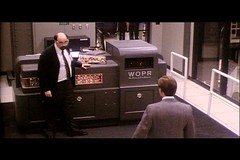
WOPR - Original
Originally uploaded by chriskice
The machine is us/ing us really captured what makes 2.0 technology exciting to me. Content and form are finally separated. Everyday users (like me) are being empowered with tools that allow us to reshape and reorganize and reclassify the pieces.
Detractors--and there are a remarkable number of librarians in that camp--have a hard time recognizing how truly revolutionary this is.
Librarians often think about their print collections as organic things and, in the most ideal sense, view collection development as a collaborative effort--building and changing the scope of their print collection as the needs of the community change.
2.0 tools allow that same kind of evolution for online content, but in real-time and by including many more voices in the conversation. How is that not exciting to information professionals?!
The coolest (and most thought-provoking) thing about Wesch's piece was when he pointed out how these tools will cause us to rethink copywrite, authorship, privacy, aesthetics, ethics, love, family and ourselves.
I also spent part of this week reading the pieces by Storey, Stephens, Shultz and Anderson. Lots of interesting ideas; I agreed with some and I had a harder time with others.
I'm really glad there are people out there debating theory and talking about the edges of things. We need them; however, there were a few times I kept wondering about how some of their ideas play out practically.
For example, while this sounds great--Librarian 2.0 does not create policies and procedures that impede users' access to the library...
How is our SAM system not an impediment to access?
What about needing a library card to access online databases from outside the library?
I can understand the cases for and against each of these things.
Slogans are great, but when you actually work on the front lines of service, things can get (needlessly?) complicated and bureaucratic very quickly; especially as we try to please many different camps, each with their own agendas--patrons, librarians, library boards, county commissioners.
Does this always have to be the case? I don't know.
Can we reach compromises? I hope so.
The good thing is that we have a dialogue about these issues.
Some of the other great soundbytes from the articles--
Perpetual beta!!!--Librarians, libraries, library services are all works-in-progress. We should never reach the point where we think were done.
Digital natives take 2.0 for granted.--This is beyond a doubt. Patrons expect the library's web presence to reflect the same ease of use and accessiblity and collaborative nature that they find on any other webpage. They are comfortable with Google. They like Amazon. If we're lucky, patrons struggle through our sites wondering why we're not more like Google and Amazon. If we're not lucky, they leave our sites and don't come back. That's a nice segue into...
We need to focus our efforts not on teaching research skills but on eliminating the barriers that exist between patrons and the info they need, so they can spend as little time as possible wrestling with lousy search interfaces and as much time as possible actually reading and learning...If our services can't be used without training, then it's the services that need to be fixed--not our patrons.--Couldn't have said it better myself.
No comments:
Post a Comment